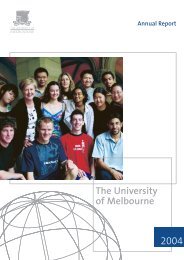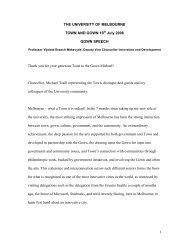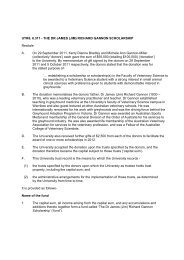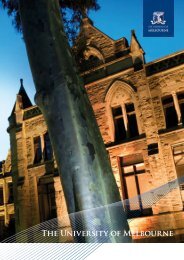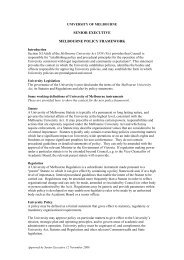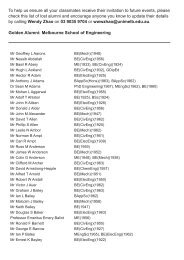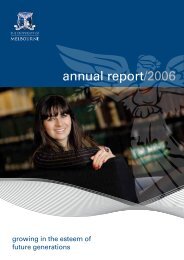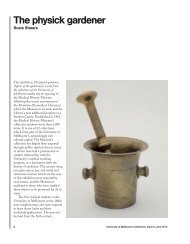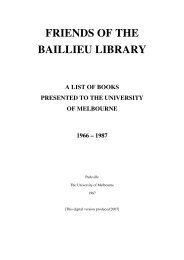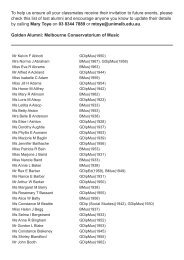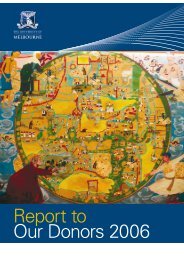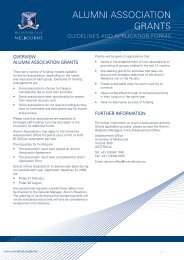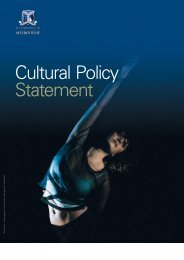2010 International Undergraduate Prospectus nts. u.au
2010 International Undergraduate Prospectus nts. u.au
2010 International Undergraduate Prospectus nts. u.au
You also want an ePaper? Increase the reach of your titles
YUMPU automatically turns print PDFs into web optimized ePapers that Google loves.
84<br />
The Master of Engineering offers the<br />
following specialisations: Biomedical<br />
Engineering Q; Biomolecular Engineering Q;<br />
Chemical Engineering Q; Civil Engineering;<br />
Electrical Engineering; Environmental<br />
Engineering Q; Geomatics Q; Mechanical<br />
Engineering; Mechatronics Q; Software<br />
Engineering; and Structural Engineering Q.<br />
Q These specialisations will be available from 2011.<br />
More information: www.eng.unimelb.edu.<br />
<strong>au</strong>/Postgrad/MEng.html<br />
Creating a world of career<br />
opportunities<br />
With a range of engineering disciplines<br />
offered at the University of Melbourne<br />
stude<strong>nts</strong> graduate from their course of<br />
choice and pursue local and international job<br />
opportunities in a range of areas, such as:<br />
> >Biomedical Engineering: biomedical<br />
industries and hospitals, regulatory<br />
<strong>au</strong>thorities, consultancies<br />
> >Biomolecular Engineering: food and<br />
beverage industries, pharmaceuticals and<br />
biotechnology<br />
> >Chemical Engineering: food, beer and<br />
wine industry, mining and petroleum<br />
industries<br />
> >Civil Engineering: manufacturing<br />
companies; research organisations;<br />
academic institutions; energy and<br />
consulting agencies; and private sector<br />
> >Electrical Engineering: technical<br />
specialists; signal processing engineers;<br />
computer engineers; and with companies<br />
that develop ‘smart’ products<br />
> >Environmental Engineering: consulting<br />
firms; urban and rural water agencies;<br />
conservation and natural resource<br />
departme<strong>nts</strong>; environment protection<br />
agencies; and academic organisations<br />
> >Geomatics: licensed surveyors;<br />
environmental remote sensing; land and<br />
resource management<br />
> >Mechanical Engineering: car industry;<br />
manufacturing; design; essential services<br />
and consulting firms<br />
> >Mechatronics: careers with companies<br />
that use advanced <strong>au</strong>tomation<br />
equipment; computer-integrated<br />
manufacturing systems; in the private and<br />
public sector<br />
> >Software Engineering: designers;<br />
developers; project managers; database<br />
managers; programmers; web producers;<br />
analysts; and consulta<strong>nts</strong><br />
> >Structural Engineering: research<br />
organisations; academic institutions;<br />
consulting agencies; and private sector<br />
construction firms.<br />
Professional and international<br />
degree recognition<br />
The five-year engineering program has<br />
been provisionally approved by Engineers<br />
Australia (the Institute of Engineers in<br />
Australia).<br />
Stude<strong>nts</strong> must complete an undergraduate<br />
degree, with an approved sequence of<br />
engineering subjects, followed by the<br />
two to three-year Master of Engineering<br />
(dependent on background), to receive<br />
accreditation as a professional engineer.<br />
Master of Food Science<br />
Duration and campus<br />
2 years full-time<br />
Parkville<br />
Entry requireme<strong>nts</strong><br />
A three-year undergraduate degree in<br />
a cognate Q discipline with a weighted<br />
average of at least 65%, or equivalent; or<br />
An Honours degree in a cognate<br />
discipline Q or equivalent.<br />
Q A cognate discipline refers to food science,<br />
biochemistry, microbiology, biotechnology/<br />
bioengineering and related disciplines.<br />
Extra requireme<strong>nts</strong><br />
No<br />
More information<br />
Course Co-ordinator<br />
Master of Food Science (coursework)<br />
t +61 3 8344 7834<br />
f +61 3 9348 2156<br />
e via http://landfood-unimelb.custhelp.com<br />
w www.foodscience.unimelb.edu.<strong>au</strong><br />
Course description<br />
The Master of Food Science has been<br />
developed for graduates holding a<br />
science or engineering degree seeking<br />
specialist training for a career in the<br />
food manufacturing industry. Each<br />
student completes a tailored program of<br />
coursework subjects incorporating core<br />
study areas and electives in addition to a<br />
research project in an approved area of<br />
food science.<br />
As a graduate you will be well prepared<br />
to play a key role in research divisions<br />
within food companies and associated<br />
organisations, as well as in managing food<br />
production across the entire food supply<br />
chain.<br />
The objectives of the course are to:<br />
>>Enable you to explore the inter-disciplinary<br />
nature of agriculture, food production and<br />
food science at an advanced level<br />
>>Provide you with a sound foundation in<br />
food chemistry, microbiology, quality and<br />
processing<br />
>>Introduce you to advanced research<br />
topics and the practical application of<br />
these topics within food science<br />
>>Develop competence in the design,<br />
conduct and analysis of experimental<br />
work<br />
>>Develop research skills in an aspect of<br />
food science and related technologies<br />
>>Introduce industrial applications of<br />
food science and technology and the<br />
commercial outcomes<br />
>>Increase the understanding of the<br />
specialised disciplines of food science,<br />
emerging technologies and the relevance<br />
of this to the future food industry<br />
>>Develop a critical understanding of the<br />
economic, social and ethical factors<br />
related to food production in Australia and<br />
globally.<br />
The course is normally delivered fulltime<br />
over two years through a mixture of<br />
classroom teaching, residential schools<br />
and distance education. It will require<br />
completion of coursework plus a minor<br />
dissertation, which will be undertaken with<br />
appropriate academic supervision.<br />
Creating a world of career<br />
opportunities<br />
Career choices for food science graduates<br />
are vast and growing. They include:<br />
research and development; safety and<br />
regulation, as well as quality assurance<br />
roles in food processing companies.<br />
Food Science Graduates can be<br />
employed in companies that support food<br />
manufacturers by supplying food additives<br />
and ingredie<strong>nts</strong>, processing equipment<br />
and packaging materials. Graduates with<br />
interest in teaching and research can<br />
find rewarding careers in universities and<br />
research institutes.<br />
Professional and international<br />
degree recognition<br />
Graduates from the Master of Food Science<br />
can be found working around the world.<br />
This course allows you to apply your skills<br />
in a broad range of careers and industries<br />
in Australia and overseas, and University<br />
of Melbourne graduates are recognised<br />
internationally.




